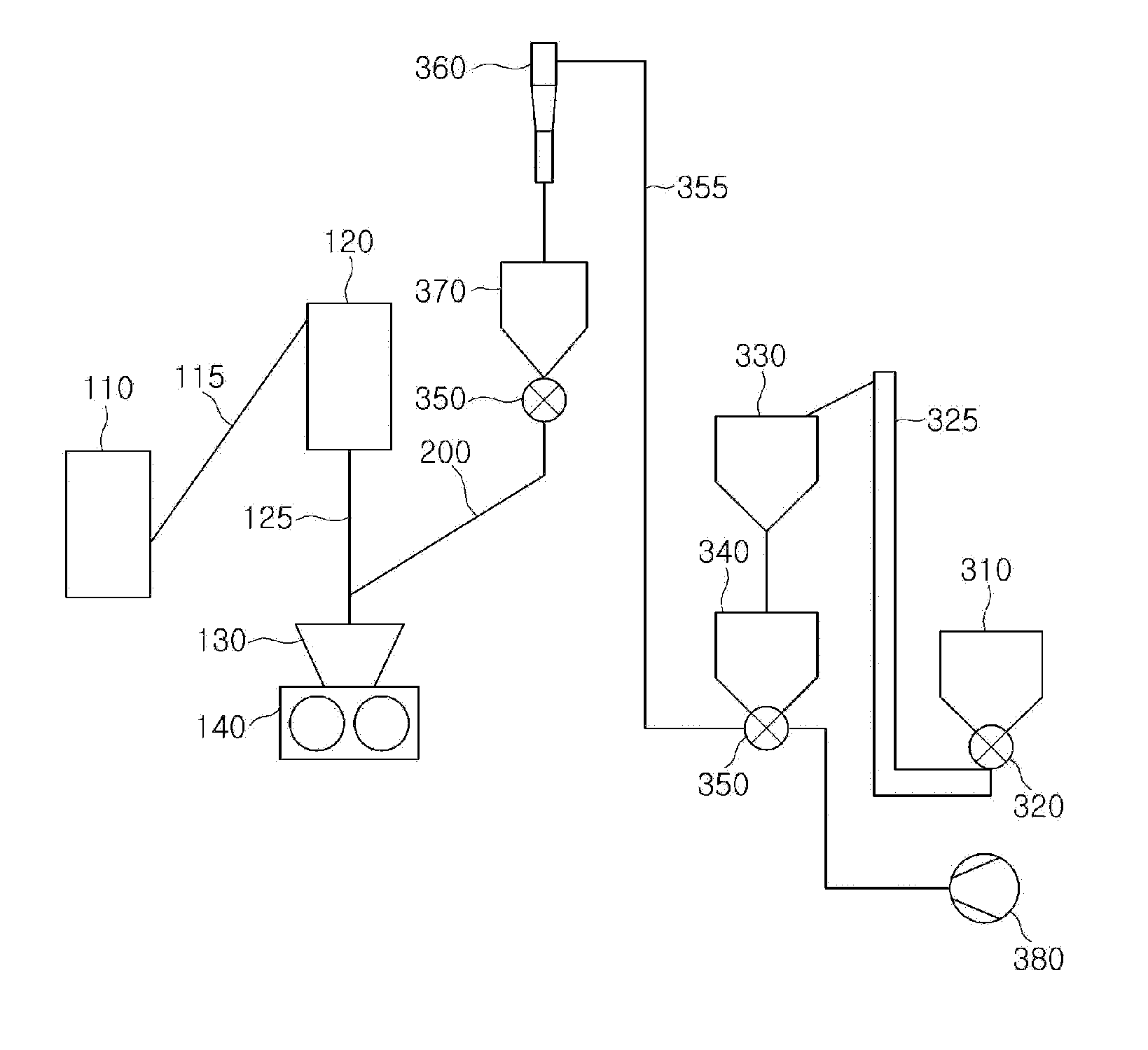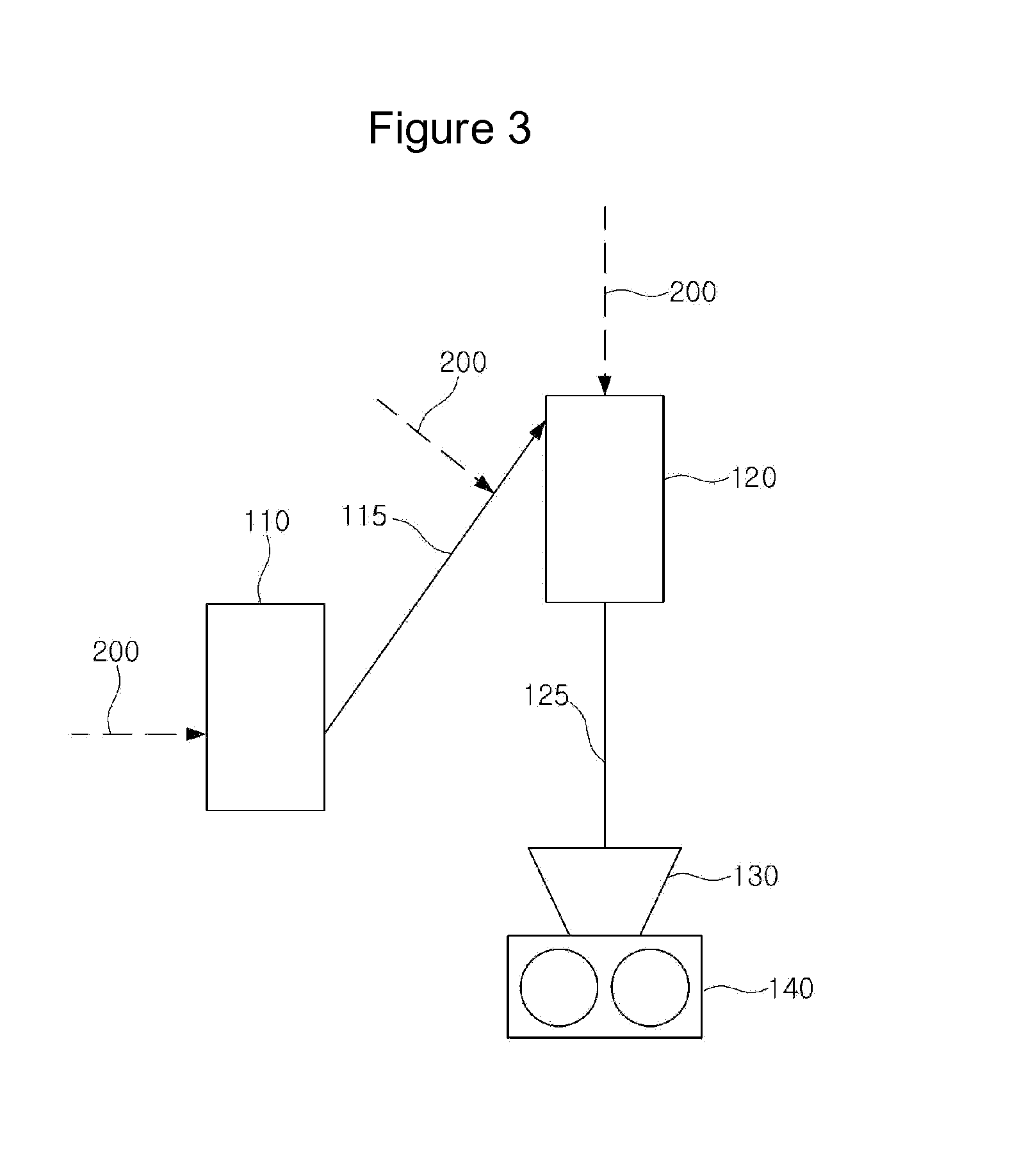Method for recycling iron-containing by-products discharged from coal-based molten ironmaking process, system therefor, and reduced iron agglomeration system
- Summary
- Abstract
- Description
- Claims
- Application Information
AI Technical Summary
Benefits of technology
Problems solved by technology
Method used
Image
Examples
example 1
[0128]In Example 1, sludge and dust generated from a FINEX process for making molten iron (molten iron making FINEX process) were agglomerated through a by-product agglomeration process shown in FIG. 1.
[0129]In detail, sludge 20 having a moisture content of about 40 wt % and dust 30 having a moisture content of about 15 wt %, which were by-products discharged from a molten iron making FINEX process, were prepared at a weight ratio of 7:3.
[0130]Half the sludge 20 was supplied to the sludge dryer (rotary kiln furnace) 240 in which the half of the sludge 20 was heated to remove moisture.
[0131]Then, the half of the sludge 20 which was heat-dried was supplied to the by-product agglomeration device 230 being an agitation mixer, and the other half of the sludge 20 which was not dried was directly supplied to the agitation mixture to mix the non-dried half of the sludge 20 with the dried half of the sludge 20. In addition, the dust 30 was supplied to the agitation mixer.
[0132]The by-product...
example 2
[0136]In Example 2, sludge and dust generated from a molten iron making FINEX process were agglomerated through a by-product agglomeration process shown in FIG. 2.
[0137]The same by-products as the by-products used in Example 1 were prepared from a molten iron making FINEX process.
[0138]All sludge 20 was supplied to the sludge dryer (rotary kiln furnace) 240, and the sludge 20 was heated in the sludge dryer 240 to remove moisture.
[0139]The dried sludge 20 was supplied to the agglomeration device 235 being a pelletizer, and dust 30 was also supplied to the pelletizer. The by-products (the sludge 20 and the dust 30) mixed in the pelletizer had a moisture content of about 5 wt % based on the total weight of the by-products.
[0140]Water was supplied to the pelletizer to adjust the moisture content of the by-products to be 8 wt %, and then the by-products were agglomerated as pellets using the pelletizer.
[0141]Thereafter, the pellets were transferred from the pelletizer to the compaction d...
example 3
[0143]Equal weights of sludge and dust generated from a molten iron making FINEX process and having the compositions shown in Table 1 were mixed with each other for about 3 minutes using an Eirich mixer. In this manner, pellets having an average particle size of 2 mm were obtained.
[0144]The pellets were dried in an oven dryer at 105° C. for 24 hours to fully remove moisture from the pellets.
[0145]Thereafter, the pellets were mixed with reduced iron at a weight ratio of 2:8 to form a mixture sample, and 100 g of the mixture sample was agglomerated at 600° C. while applying a pressure of 150 MPa to the mixture sample to form disk-shaped compactions. Then, the compressive strength of the disk-shaped compactions (sample) was measured.
[0146]After excluding abnormal values, 10 measured values were averaged. The average compressive strength is shown in Table 2.
PUM
| Property | Measurement | Unit |
|---|---|---|
| Particle size | aaaaa | aaaaa |
| Particle size | aaaaa | aaaaa |
| Flow rate | aaaaa | aaaaa |
Abstract
Description
Claims
Application Information
 Login to View More
Login to View More - R&D
- Intellectual Property
- Life Sciences
- Materials
- Tech Scout
- Unparalleled Data Quality
- Higher Quality Content
- 60% Fewer Hallucinations
Browse by: Latest US Patents, China's latest patents, Technical Efficacy Thesaurus, Application Domain, Technology Topic, Popular Technical Reports.
© 2025 PatSnap. All rights reserved.Legal|Privacy policy|Modern Slavery Act Transparency Statement|Sitemap|About US| Contact US: help@patsnap.com



